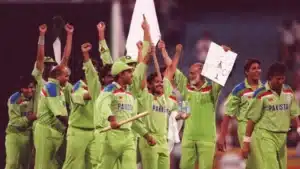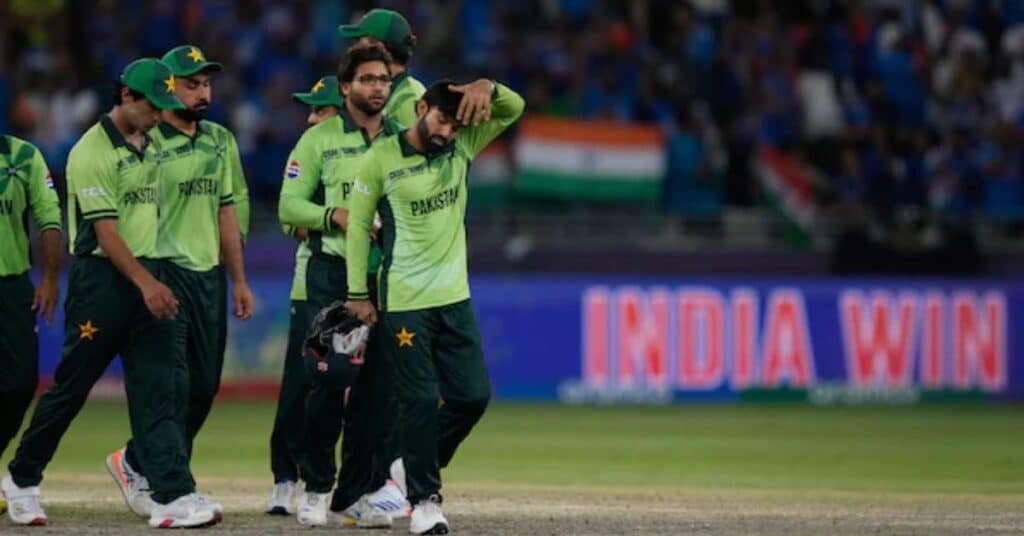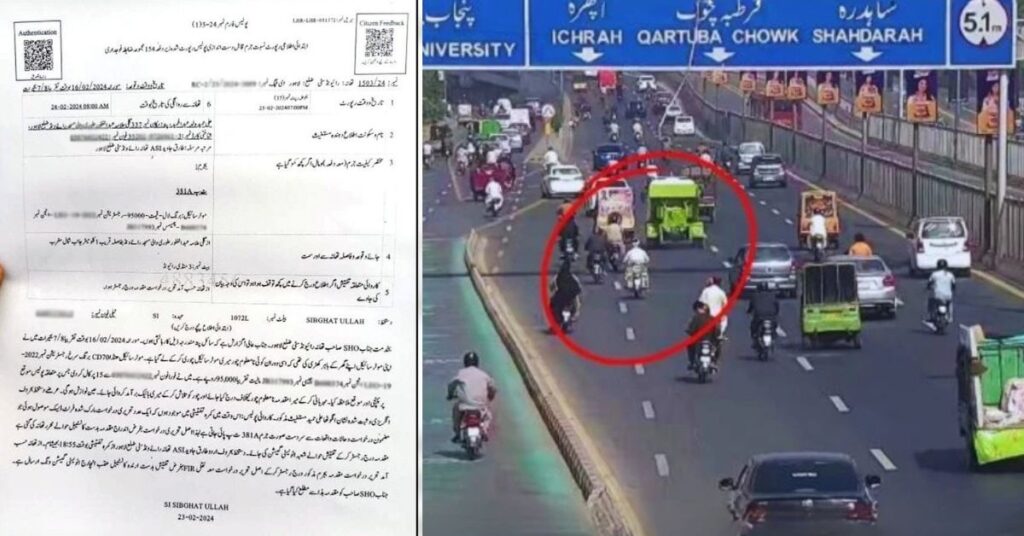MUZAFFARABAD (Kashmir English): Pakistan cricket crisis reaches peak as it is facing one of its darkest periods following the humiliating first-round elimination from the Champions Trophy 2025. The tournament exposed deep-rooted issues that have plagued the sport for years.
These issues are a mix of administrative incompetence, outdated decade-old strategies, and a lack of professionalism. Once a force to be reckoned with, the Pakistan Cricket team, the one honourable champion of ICC World Cup 1992, has become an irrelevant entity in modern cricket, unable to keep up with the evolving demands of the game.

The PCB’s failure: A system victim of nepotism and cronyism
At the heart of Pakistan cricket crisis is the Pakistan Cricket Board (PCB), for it is an institution that has been a breeding ground for favouritism, political interference, and mismanagement for a long period.
Instead of focusing on meritocracy and professional excellence, the PCB has functioned as a personal fiefdom for chairmen, transforming their position into a personal rule that selects supporters as employees while dividing positions between past players with old-school approaches and government officials who do not grasp cricket. The result? A dysfunctional system where decisions are made not in the interest of Pakistan cricket but to prioritise personal benefits.
One of the biggest failures of the PCB has been that it is unable to build a strong domestic cricket structure. The system is void of the necessary infrastructure, coaching expertise, and financial incentives to nourish world-class talent.
Once known as a pace bowling powerhouse with legends such as Imran Khan, Javed Miandad, Shoaib Akhtar and Hanif Mohammad, Pakistan now struggles to even produce fast bowlers who can clock high speeds consistently.
It is not only the bowling unit that needs to be fixed, the batting unit also remains weak, and the players lack the temperament and technique needed for present-day cricket. The spin unit is in complete disarray as well, and fitness standards continue to be well below international standards. In short, the talent Pakistan has needs polishing and recognition.

The situation becomes further chaotic because of the obvious preferential treatment during mentor and administrative position appointments. Several former cricket players accept lucrative roles from the PCB without established development goals, thus making their appointments serve as monetary benefits instead of developmental positions.
The PCB has appointed individuals who repeat the chairman’s views without objecting to them instead of bringing experienced professionals to improve the current system. The lack of experienced professionals in Pakistan cricket is bitterly evident as it has caused strategic analysis to worsen, together with strategic planning and dropped overall professional standards.
On-field decline: A reflection of systemic rot
Pakistan’s failure in the Champions Trophy 2025 was not an accident, it was inevitable, highlighting the Pakistan cricket crisis. The warning signs have been visible for a long time now, long before the tournament had started. An example is how Pakistan struggled in a home Triangular series against New Zealand, a team that once found it difficult to compete with the subcontinent’s giants.
The opening match of the Champions Trophy proved Pakistan’s inadequate preparation when the team suffered defeat against New Zealand comfortably. In Pakistan’s tense meeting against India, Virat Kohli hit a hundred that revealed the outdated direction of Pakistan’s cricket approach.
The most alarming aspect of these defeats is not just the score margins of loss, but how Pakistan played. The team’s performance fell short of expectations, lacking clarity, design, and mental resilience.
Other teams have adapted to modern cricketing methods, data-driven strategies, and sports science, while Pakistan remains tangled in age-old selection policies and flawed coaching plans. The gap between Pakistan and top-tier teams is broadening, whether in terms of game awareness, fitness levels, mental strength, or adaptability.

A primary concern exists because Pakistan has not developed experienced professionals in their national team. Pakistan’s test and ODI cricket domains suffer from a shortage of reliable opening batsmen and dependable fast bowlers who maintain 145-150 kph speeds plus effective batting all-rounders and powerful hitters.
The cricketing legends who should have taken over kept empty positions which resulted in a significant gap evident in the Pakistan cricket organization.
Major cricket jurisdictions including Australia, England, New Zealand and India have updated their systems by building programs for player progress alongside data analytics and athlete management protocols. Pakistan attempts to operate through outdated structures which generate the same ineffective results from their failing system.
Pakistan cricket crisis: The road to recovery
Pakistan cricket experiences a critical decision-making point. The current method of administration faces complete collapse because changes need to happen immediately to prevent future failures.
The PCB must:
The selection of professional leadership with competence should take place without any political involvement.
The organization should adopt a selection system which evaluates candidates based on their performance and their actual abilities as opposed to family relationships. The time has arrived to put an end to nepotism and cronyism in the management structure.
Assist the domestic system through proper financial support to cultivate young talent.
The PCB should terminate its practice of promoting retired players and selecting new talents by hiring coaches, analysts, and fitness experts who demonstrate modern professional capabilities.
The team should initiate high-performance training programs with grassroots cricket development through proven successful team methodologies.
Integrating psychological strategies to reduce stress and build stronger mental resilience.

The time for decorative fixes is over. If cricket is to regain its lost glory and crawl out of the Pakistan cricket crisis, the PCB must rebuild its structure, embrace professionalism, and put the sport above personal interests. Otherwise, Pakistan cricket will continue its freefall, and its once-feared reputation will become nothing more than a distant memory.




